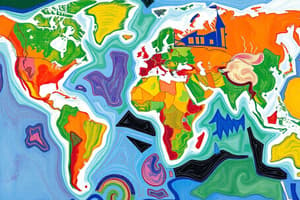Podcast
Questions and Answers
What does the word geography mean?
What does the word geography mean?
Description of the earth
Who is known as the father of geography?
Who is known as the father of geography?
Hecatus
Who coined the term 'geography'?
Who coined the term 'geography'?
Eratosthenes
Which of the following best describes Geography?
Which of the following best describes Geography?
Match the branch of geography with its description.
Match the branch of geography with its description.
Which of the following is NOT a sub-field of Physical Geography?
Which of the following is NOT a sub-field of Physical Geography?
What are the five elements of Natural Environment in Physical Geography?
What are the five elements of Natural Environment in Physical Geography?
Human geography deals with the study of man and his activities on the surface of the earth in relation to __________.
Human geography deals with the study of man and his activities on the surface of the earth in relation to __________.
Which of the following is a sub-field of Social Geography?
Which of the following is a sub-field of Social Geography?
Economic geography studies the variation of economic activities in relation to the environment.
Economic geography studies the variation of economic activities in relation to the environment.
What is the main focus of Cultural Geography?
What is the main focus of Cultural Geography?
Which branch of geography studies the relationship between climate and weather?
Which branch of geography studies the relationship between climate and weather?
What are the two main branches of Geography?
What are the two main branches of Geography?
Flashcards are hidden until you start studying
Study Notes
Meaning of Geography
- Derived from Greek words: "geo" (earth) and "graphy" (description).
- Geography is the description of the Earth, focusing on the relationship between man and his environment.
Historical Overview
- First noted scholar: Hecatus, who described lands and people near the Mediterranean Sea.
- Hecatus's work titled "lies, periods" contributed to his recognition as the father of geography.
- Eratosthenes coined the term "geography" around 200 B.C. and described lands and people.
- Influential definitions of geography come from various scholars, emphasizing aspects like ecology, distribution, spatial variations, and human-environment interaction.
Structure of Geography
- Geography consists of two primary branches: Physical Geography and Human Geography.
Physical Geography
- Focuses on the natural environment including five elements: land, water, air, plants, and animals.
- Subfields of Physical Geography:
- Geomorphology: Study of landforms and drainage patterns.
- Climatology: Study of weather and climate.
- Biogeography: Study of distribution of plants and animals.
- Soil Geography (Pedology): Focus on soil characteristics and distribution.
- Hydrology: Study of water properties and distribution.
Human Geography
- Examines human activities on the Earth's surface in relation to the environment.
- Three types of human activities:
- Living on the Earth’s surface.
- Creating livelihoods.
- Designing living spaces.
- Divided into three branches:
- Social Geography: Studies the arrangement of social phenomena.
- Subfields: Settlement geography, population geography, political geography, medical geography.
- Economic Geography: Focuses on spatial variations in economic activities.
- Subfields: Geography of resources, agricultural geography, transport geography, industrial geography.
- Cultural Geography: Studies distribution and interaction of cultural groups.
- Subfields: Languages, religion, tools and skills, social organizations.
- Social Geography: Studies the arrangement of social phenomena.
Methods of Study in Geography
- Divided into two approaches based on methodology:
- Systematic Geography: Examines specific geographical factors across large areas.
- Regional Geography: Analyzes a region’s character by integrating various phenomena.
Techniques in Geography
- Two main techniques for geographical study:
- Cartography: The science of map-making and representations.
- Use of maps and spatial analysis as primary tools to understand geographical phenomena.
Studying That Suits You
Use AI to generate personalized quizzes and flashcards to suit your learning preferences.




